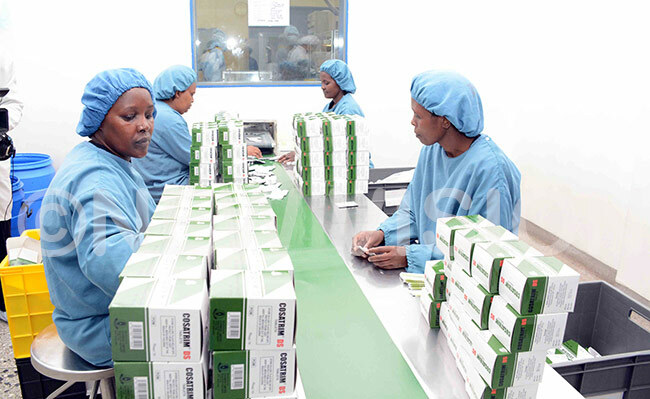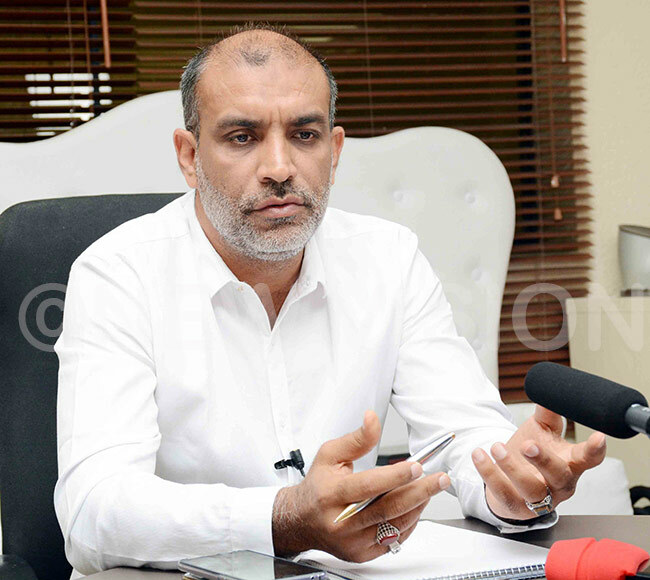Local pharmaceutical appeal to EAC govts for protection against imported drugs
The manufacturers also complain that importers of cheap medicines win tenders to supply medicines to government institutions and agencies because they bid with relatively lower rates.
Workers in a laboratory at Cipla quality chemical industries limited in Uganda. Photos by Eddie Ssejjoba
Pharmaceutical manufacturers in the East African Community (EAC) have appealed to authorities in partner states to impose duties on imported medicines that compete with the locally manufactured.
They say the medicines imported from mainly China and India, where manufacturers enjoy big economies of scale and get subsidies from their governments were killing local industries by selling cheap products, making it hard for them to compete in the market.
The manufacturers also complain that importers of cheap medicines win tenders to supply medicines to government institutions and agencies because they bid with relatively lower rates.
 Nevin Bradford, the chief executive officer of Cipla Quality chemical Industries limited
Nevin Bradford, the chief executive officer of Cipla Quality chemical Industries limited
The status quo, according to manufacturers, renders local industries losers yet they pay taxes and provide employment to many people.
Rene Industries Limited, manufacturers of pharmaceutical formulations in Uganda, asked the National Drug Authority (NDA) to always give preference to local manufacturers when sourcing for suppliers of medicines under the ‘Buy Uganda Build Uganda (BUBU) policy instead of leaving it open.
Rishi Vadodaria, the managing director said the policy would build local capacity and open up to International suppliers for only items that cannot be sourced locally. He suggested for tariffs on importation of locally available products.
 Workers sorting out medicine in Cosmos pharmaceutical company in Kenya
Workers sorting out medicine in Cosmos pharmaceutical company in Kenya
Rishi asked the EAC secretariat to find a quick solution to imported cheap medicines which he said cripple local industries, saying many industries were threatened by ‘dumping’ of cheap medicines.
Nevin Bradford, the Chief Executive Officer of Cipla Quality Chemicals Industries Limited, leading manufacturers of pharmaceutical medicines in Uganda however said the key to competing fairly with big foreign companies was not to compromise the quality of local products.
“Local industries in the EAC must remain as efficient as possible, quality comes with a price,” he said, adding the Cipla quality Chemicals qualify to supply to the World Health Organization because of their high quality products.
Bradford however also asked EAC partner states to provide a level playing field for local companies like it is the policy in Ghana where importation of similar products produced locally was banned.
 Rolando Satzke, the Chief Executive Officer of Cosmos Limited in Kenya
Rolando Satzke, the Chief Executive Officer of Cosmos Limited in Kenya
He acknowledged that the pharmaceutical industry in EAC was facing numerous challenges and should be supported. He said the industry should be bigger as compared to the population, expressing the need for governments to let them thrive in order to give security of supply of life-saving medicines.
According to Bradford, the cost of production in the region is high because almost all the ingredients in the manufacture of medicines were being sourced from either China or India, which makes production costly.
Salim Somji, the chairman Siphar, the only pharmaceutical manufacturing company in Burundi said it was hard for his company that produces one million tablets a day to compete with companies in China and India that produce 15m a day, yet the imports from these companies are not taxed.
 Ephraim Mulisa, the plant director Pharma Lab of Rwanda
Ephraim Mulisa, the plant director Pharma Lab of Rwanda
He said in Burundi, most government tenders are given to importers because of ‘corruption’ in the tendering system, making it irrelevant to invest in Africa.
“The imports get subsidies and zero tariffs from their respective governments but many of the raw inputs to our industries are taxed,” Salim stated, adding that apart from water and electricity, all the raw materials are imported.
Piere Claver Niyonizigeye, the company director of administration also decried the bureaucracy in the government tendering system and corruption, saying for two years their export application had not been renewed, and were unable to even sell their products within the region because some officials demanded for bribes and asked the EAC to enact a law protecting local industries.
In Rwanda, the Pharma Lab Limited, manufacturer of medical and laboratory consumables, was also facing challenge of counterfeits, substandard and cheap imports on the market.
Cecile Nkomeje, the managing director and Ephraim Mulisa stated that the National Bureau of Standards had failed to check on substandard products that flood the market, many without labels, which compete with local products.
“We appeal to EAC to put a tax on all products from outside the region, which are also manufactured here to boost local industries,” Mulisa said.
 Salim Somji, chairman of Siphar pharmaceutical industries of Burundi
Salim Somji, chairman of Siphar pharmaceutical industries of Burundi
Rolando Satzke, the chief executive officer of Cosmos Pharmaceutical Limited, leading manufacturers of human health medicine and veterinary drugs in Kenya said the region was faced with cheap substandard drugs.
“To reach universal healthcare coverage, governments should favor locally manufactured medicines in during procurement,” he said.
He said increased production of local drugs would reduce the cost of medicine for the local people.
He gave an example of countries like Morocco, South Africa, Ghana, India and Bangladesh, which have policies that favor local industries, which he said had consequently reduced the cost of medicine and boosted the ability of population to afford them.
He said in Kenya, 70% of medicines consumed are imported but at the EAC level 90% of medicines consumed are imported.
He explained that importation of largest percentage of medicines keeps the costs high, yet not all what is import is controlled and is high quality.